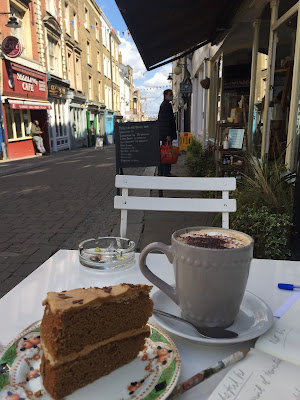Laying down roots
David moved to Gravesend from London three years ago with his partner. He used to live in an artist community in North London but couldn’t see a way to buy a place, to support starting a family. The move to Gravesend was prompted by economic necessity, rather than attraction to place. But, as David talks, I sense a deep and growing affection for Gravesend. David and his partner decided quite quickly that this town would not just be somewhere they slept – they wanted to become part of and support the community. Meeting key community connectors has helped them discover the place through a network of people – including Lauren.
David remembers being welcomed on his first day by some older residents and neighbours, and feeling really excited by the sense of community and neighbourliness. At the same time a throwaway comment suggested a racist othering of a different neighbour. He wondered for a moment if he had made the wrong choice. David notices there is a gulf in politics between some Gravesend residents he have met – maybe along generational lines? The fantastic Mela’s and street festivals and parades held by the Sikh community are something that David appreciates, he wonders how these can become more and more integrated. So that more white residents participate and engage more fully in this vibrant cultural offer. I think about my own upbringing in a small, predominantly white town, and how my delight in joining in with any cultural celebration – especially if it includes food and art – developed.
David wanted me to know about all the independent businesses – owned and run by local people. Most people earn money in the Borough and it stays there, recycled through those local businesses. We talk about how this builds economic resilience as well as community distinctiveness. I later learn that Gravesham has the highest number of sole traders of anywhere in Kent.
In particular, David tells me, there are lots of great, unique independent pubs – The Mole Hole with a range of great beers. The Compass Ale House, owned and run by a group of six retirees who created somewhere they wanted to go. Designed to feel like a front room, with books and maps, phones are forbidden – they want people to talk and connect. There is no bar – you wander through to the kitchen and one of the team will serve you. It’s got a strong community focus. I’m really sad that I won’t get to experience this part of Gravesend during the residency. I notice that I’m experiencing a place stripped back – the landscape and the people.
David is interested in housing stock, having made a documentary some years ago, he finds himself drawn to explore the housing on offer wherever he is – it says a lot about an area. David references a new development behind the hospital, possibly in an old factory or mill building. We chat about the new development planned for by St Andrew’s Quay – what will the quality and affordability of that housing be? Who will it be for? David notes that housing seems relatively accessible and rents are more affordable here. I decide to explore that next week.
David feels that Gravesend is a place, where, at its core people care. He wonders if the council matches this care in what it actually does?
David is excited for the Thames estuary investments, artistically and financially. He hope to be able to move his business entirely to the area and join those people who are the engines of the local economy. David is concerned that local development doesn’t make Gravesend a gentrified dormitory town for ‘DFLs’, he hopes that people who choose to move here will also choose to enrich and support what already exists. Rather than create a pale grey fronted coffee shop indistinguishable from anywhere else.
I ask David what he does for fun and we joke that he doesn’t have time for after school activities – I also know the challenge of freelancing irregular hours and trying to be part of a sporting or social club. David notes that there are opportunities to do this, and maybe as things open up, and if he manages to shift his working life more, Gravesend would be a great place to join in with something.
David and I finish our chat with some suggestions of their favourite things – the amazing local food, giving a shout out to Macknades (a bit further afield) and the local Harvel House Farm shop and also the brilliant Iron Pier brewery. The abundance of natural spaces and country parks in all directions is also something he enjoys and values deeply.
As we say goodbye, David says, ‘I’m a local now, I’m from Gravesend – I want to support this community and help make positive changes’. He sees challenging times ahead, especially the economic impacts of Covid and Brexit, but feels hopeful for this entrepreneurial community.
I’m struck by the similarities with my other conversations – that community feels more like a verb than a noun. I admire David’s boldness and generosity in putting down roots and trying to invest in, and shape where he lives – it’s much easier and less risky to be passive. Easier to just be alive somewhere, rather than live there. It’s been great that on the same day I’ve spoken to someone whose spent their whole life in Gravesham to someone who is a much newer arrival – and to notice so many common threads of connection between their experiences of, and hopes for, the place.



Comments
Post a Comment